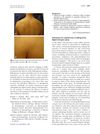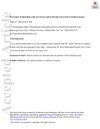 39 citations,
November 2015 in “Nanomedicine”
39 citations,
November 2015 in “Nanomedicine” Improved Finasteride delivery for hair loss treatment.
13 citations,
July 2016 in “Veterinary Dermatology” Spray B was most effective in reducing bacteria on dog hair.
11 citations,
October 2021 in “Journal of The European Academy of Dermatology and Venereology” Topical finasteride is an effective and safer treatment for male hair loss.
 7 citations,
January 1990 in “Eisei kagaku”
7 citations,
January 1990 in “Eisei kagaku” Chemical analysis of hair products on human hair can help identify specific brands and link suspects to victims.
5 citations,
July 2018 in “Skin appendage disorders” Sunscreen spray on the scalp may be linked to a type of scarring hair loss.
 2 citations,
September 2018 in “Journal of Separation Science”
2 citations,
September 2018 in “Journal of Separation Science” PSI-MS quickly and accurately measures finasteride in tablets, helping with quality control.
2 citations,
February 2013 in “Journal of the Saudi Society for Dermatology & Dermatologic Surgery” New hair spray caused a hair shaft disorder.
2 citations,
October 2010 in “PubMed” The new stiffness test works well for gels but not for sprays.
 February 2019 in “Case medical research”
February 2019 in “Case medical research” The document does not state whether dexpanthenol dermal spray helps skin recover after laser hair removal.
21 citations,
April 2018 in “The Journal of urology/The journal of urology” SER120 nasal spray effectively reduces nighttime urination and is safe for patients.
 15 citations,
October 2006 in “Journal of the American Academy of Dermatology”
15 citations,
October 2006 in “Journal of the American Academy of Dermatology” Liquid nitrogen spray caused a temporary, harmless swelling under the skin in an elderly woman.
 1 citations,
August 2020 in “Journal of Cosmetic Dermatology”
1 citations,
August 2020 in “Journal of Cosmetic Dermatology” The "After Minoxidil" spray makes hair easier to style, less greasy, and encourages people to keep using the treatment.
 February 2025 in “Advances in Therapy”
February 2025 in “Advances in Therapy” The topical finasteride spray was safe and well-tolerated with stable effects.
 October 2024 in “International Journal of Pharmaceutical Sciences Review and Research”
October 2024 in “International Journal of Pharmaceutical Sciences Review and Research” A 5% minoxidil spray could effectively treat male baldness with fewer side effects and better patient comfort.

Monthly PRP therapy is more effective than daily minoxidil for alopecia areata.
 November 2023 in “Advanced functional materials”
November 2023 in “Advanced functional materials” Magnesium Silicate Sprays help heal burn wounds and regrow skin features better than commercial products.
 April 2021 in “HIV & AIDS Review”
April 2021 in “HIV & AIDS Review” Glycyrrhizinic acid spray showed limited effectiveness in treating anogenital warts in HIV patients with low CD4 levels.
 1 citations,
January 2016 in “PubMed”
1 citations,
January 2016 in “PubMed” Keratogrow®, a spray made from patients' own blood, was found to increase hair growth and density when used twice daily for three months.
 1 citations,
January 2010
1 citations,
January 2010 Mesotherapy is more effective than topical spray for female hair loss treatment.
December 2022 in “Faculty Opinions – Post-Publication Peer Review of the Biomedical Literature” 36 citations,
August 2012 in “Dermatology online journal” Using wigs, hairpieces, and sprays can help people with hair loss feel better about themselves.
 4 citations,
September 2014 in “Elsevier eBooks”
4 citations,
September 2014 in “Elsevier eBooks” Use some skin medications with caution during pregnancy; avoid strong steroids, certain eczema treatments, and systemic retinoids, but many topical treatments and nasal sprays are safe.
 3 citations,
August 2020 in “Journal of Cosmetic Dermatology”
3 citations,
August 2020 in “Journal of Cosmetic Dermatology” Topical nitroglycerin spray effectively prevents scalp necrosis in hair transplant patients.
 November 2023 in “Journal of Drugs in Dermatology”
November 2023 in “Journal of Drugs in Dermatology” Hypochlorous acid spray improves wound healing and reduces redness and itching in hair transplant surgery.
 20 citations,
April 2016 in “Journal of Cosmetic Dermatology”
20 citations,
April 2016 in “Journal of Cosmetic Dermatology” Methyl vanillate spray increases hair count and hair mass in women with hair loss.
 September 2023 in “Medicine”
September 2023 in “Medicine” Herbal extract spray improved hair growth in a man with hair loss.
 1 citations,
October 2023 in “Journal of the Endocrine Society”
1 citations,
October 2023 in “Journal of the Endocrine Society” HIV medication ritonavir can increase the effects of nasal sprays like fluticasone, causing Cushing's syndrome.
 January 2014 in “Revista Brasileira de Cirurgia Plástica”
January 2014 in “Revista Brasileira de Cirurgia Plástica” A new method using gentian violet and a protective spray can improve symmetry and reduce surgery time in hair restoration, but it's only effective for total hair loss, not diffuse hair loss or follow-up treatments.
 12 citations,
November 2016 in “International Journal of Women's Dermatology”
12 citations,
November 2016 in “International Journal of Women's Dermatology” Various hair camouflage options help people with hair loss improve appearance.
7 citations,
February 2019 in “Veterinary medicine and science” An American Bully with a genetic skin condition improved significantly with specific topical treatments.




















